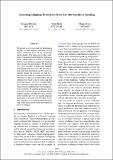Assessing Language Proficiency from Eye Movements in Reading
Author(s)
Berzak, Yevgeni; Katz, Boris; Levy, Roger P
DownloadPublished version (294.8Kb)
Publisher with Creative Commons License
Publisher with Creative Commons License
Creative Commons Attribution
Terms of use
Metadata
Show full item recordAbstract
We present a novel approach for determining learners' second language proficiency which utilizes behavioral traces of eye movements during reading. Our approach provides standalone eyetracking based English proficiency scores which reflect the extent to which the learner's gaze patterns in reading are similar to those of native English speakers. We show that our scores correlate strongly with standardized English proficiency tests. We also demonstrate that gaze information can be used to accurately predict the outcomes of such tests. Our approach yields the strongest performance when the test taker is presented with a suite of sentences for which we have eyetracking data from other readers. However, it remains effective even using eyetracking with sentences for which eye movement data have not been previously collected. By deriving proficiency as an automatic byproduct of eye movements during ordinary reading, our approach offers a potentially valuable new tool for second language proficiency assessment. More broadly, our results open the door to future methods for inferring reader characteristics from the behavioral traces of reading.
Date issued
2018-06Department
Massachusetts Institute of Technology. Computer Science and Artificial Intelligence Laboratory; Massachusetts Institute of Technology. Department of Brain and Cognitive SciencesJournal
2018 Conference of the North American Chapter of the Association for Computational Linguistics: Human Language Technologies
Publisher
Association for Computational Linguistics
Citation
Berzak, Yevgeni et al. "Assessing Language Proficiency from Eye Movements in Reading." © 2018 The Association for Computational Linguistics. 2018 Conference of the North American Chapter of the Association for Computational Linguistics: Human Language Technologies, June 2018, New Orleans, Louisiana, Association for Computational Linguistics, 2018.
Version: Final published version